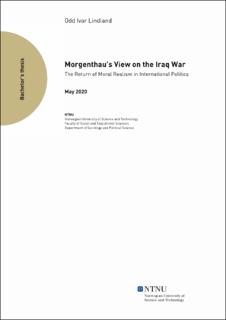| dc.contributor.advisor | Jakobsen, Jo | |
| dc.contributor.author | Lindland, Odd Ivar | |
| dc.date.accessioned | 2020-07-07T16:02:25Z | |
| dc.date.available | 2020-07-07T16:02:25Z | |
| dc.date.issued | 2020 | |
| dc.identifier.uri | https://hdl.handle.net/11250/2661057 | |
| dc.description.abstract | Irak-krigen var kontroversiell og en av de dårligste amerikanske utenrikspolitiske beslutningene i moderne tid. Bush-administrasjonens begrunnelse for krigen var i stor grad tuftet på Bush-doktrinen som representerte en betydelig endring i amerikansk utenrikspolitikk. Målet med doktrinen var å fjerne trusler fra terrorisme og ‘onde’ stater som Irak ble fremstilt som. Bush-administrasjonen hevdet at disse truslene ikke kunne demmes opp mot og at en forebyggende krig var nødvendig. Realistene var sterkt uenig i dette synet. Det viktigste argumentet mot en invasjon var at Irak-trusselen var overdrevet og kunne isoleres. En av de sterkeste kritikerne, strukturrealisten John Mearsheimer, la vekt på at maktbalanse var et mer sannsynlig virkemiddel og utfall enn båndtvangsstrategien som den nykonservative innflytelsen på Bush-doktrinen fremmet. Videre ville en invasjon av Irak møte sterk motstand blant det irakiske folket, siden det ville utløse nasjonalistiske motkrefter når demokrati ble forsøkt innført med makt.
Mens strukturell realisme fremhever maktfordelingen mellom stater, har den klassiske realismens grunnlegger, Hans Morgenthau, et mer komplekst og nyansert perspektiv på hvordan politiske ledere skal tenke og handle. Morgenthaus versjon av realisme, som jeg har valgt å kalle moralrealisme, har tydelige normative og moralske elementer som er inspirert av Aristoteles dydsetikk. Sentralt her er at politiske lederes moral er knyttet opp til deres karaktertrekk. Videre hevder Morgenthau at alle politiske beslutninger er unike valg blant ‘onde’ alternativer. En politisk leder må velge det minst onde alternativet basert på en innsiktsfull og forsvarlig vurdering av alternative løsninger på et problem eller en situasjon.
I denne oppgaven har jeg analysert det jeg kaller Morgenthaus moralrealisme og diskutert hvordan Morgenthaus syn og argumenter ville ha blitt uttrykt i forbindelse med Irak-krigen. Med henvisning til Vietnamkrigen, som Morgenthau var en sterk motstander av, ville han sannsynligvis også vært en tydelig motstander av Irak-krigen. Mens Mearsheimer i en lignende analyse la vekt på de ovennevnte strukturelle argumenter, vil jeg hevde at Morgenthau ville ha brukt elementer fra det jeg kaller moralrealisme mer eksplisitt og vært sterkt imot den moralske begrunnelsen for krigen. Han ville sannsynligvis hevdet at Bush-administrasjonen verken utførte en forsvarlig beslutningsprosess eller valgte det minst onde alternativet. | |
| dc.description.abstract | The Iraq War was controversial and proved to one of the worst US foreign policy decisions. The Bush administration’s justification for the war was largely articulated in the Bush Doctrine that represented a new US grand strategy. The objective of the doctrine was to remove threats like terrorism and threats from evil states, one of which Iraq was depicted. The Bush administration claimed that this threat could not be controlled, and a preventive war was necessary. The realist school strongly disagreed with this view. The primary argument against an invasion was that the Iraq threat was exaggerated and could be contained. One of the more vocal critics, the structural realist John Mearsheimer, emphasized that balance of power is more likely a means and an end than the bandwagoning strategy that the neoconservative influence of the Bush Doctrine promoted. Further, an invasion any aggression and prolonged against Iraq would face strong opposition among the Iraqi people since it would trigger nationalistic counterforces if democracy is externally imposed.
While structural realism highlights the distribution of power between states, the founder of classical realism, Hans Morgenthau, has a more complex and nuanced perspective on how political leaders should think and act. Morgenthau’s version of realism, which I have chosen to call Moral Realism, has clear normative and moral elements inspired by Aristotle's virtue ethics. Hence, moral leadership of statesmen is linked to their virtues. Furthermore, Morgenthau argues that all political decisions are unique choices among evil alternatives. A political leader must choose the lesser evil option based on a prudent assessment of alternative solutions to a problem or a situation.
In this thesis I have analyzed Morgenthau’s Moral Realism and discussed how Morgenthau's views and arguments would have been expressed in the context of the Iraq War. By referring to the Vietnam War, of which Morgenthau was a strong critic, he would probably join the other realists in the opposition to the Iraq War. While Mearsheimer in a similar analysis emphasized the above structural arguments, I would argue that Morgenthau would have used elements of his Moral Realism more explicitly and strongly opposed the moral rationale for the war. He would probably argue that the Bush administration neither had performed a prudent decision-making process nor had chosen the lesser evil option. | |
| dc.publisher | NTNU | |
| dc.title | Morgenthau’s View on the Iraq War - The Return of Moral Realism in International Politics | |
| dc.type | Bachelor thesis | |
